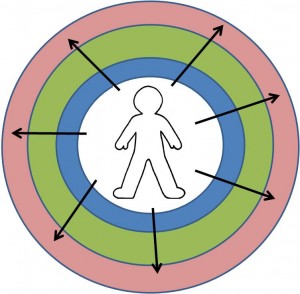An earlier version of this was first posted on 1st September 2012
If, as leaders, we want to press for improvement, and for improvement to occur in a meaningful, timely and impactful manner, we need to appreciate any resistance that we encounter from people in a different light. Rather than considering dissent and complaint as an unhelpful roadblock to change, we should view it as both an opportunity and an indicator of progress. The opportunity is that resistance opens a door to new dialogue with others. As an indicator, resistance shows us that people are noticing what we are doing. Furthermore, if that resistance is within the team, it indicates that the team itself is maturing – feeling able to challenge.
Any assertion that “people are resistant to change” should be questioned (Herrero, 2006) – people experience and engage with change in many forms; technology, services, art and culture, lifestyle – even the weather! It is too easy to assume that “there will always be casualties – people not accepting change – and you need to identify and deal with them.” The occasions when people become resistant is when change is imposed by managers who assume that people will most likely resist – in other words people need to ‘have change done to them’, that “skeptical people and enemies of change need to be sidelined” (Herero 2006). Extending that idea, Seddon (2005) suggests that the reason people are resistant to change is that they often don’t see its relevance to their work, because the rest of the system – how they are managed, doesn’t change. One rule for one group (change yourselves and get on with it) and another rule for managers (we will stick to our way of doing things).
Instead, with the right encouragement, supposedly resistant people can actually identify and discuss the other areas where change might be required. Those ‘resistors’, with the right support, can themselves start to influence wider change and improvement.
Instead when we manage change, Herrero suggests that greater care is required;
- don’t assume that people have excluded themselves.
- expect resistant behaviours to disappear when alternatives are reinforced.
- give sceptics a bit of slack (they may well have something to contribute).
- suspend judgement, be willing to be surprised, and don’t write people off too quickly.

We should also recognise that discord provides opportunity for debate and the development of new ideas. We always need to examine what ‘outsiders’ are saying and learn from them what the issues or problems really are. It is too easy to assume that “People used to not complying with norms will be even worse at accepting change.” Herrero instead suggest that, ‘non-normative’ people often make good champions once they are convinced that change is relevant.
This means that anyone involved in change, at whatever level, needs to take on responsibility for getting on with the change, to be seen to do the things that need to be done. Be open minded and able to discuss and debate effectively, not quash dissent, but seek opportunities for engaging new ideas. This takes proactivity and a consideration of alternatives (Covey, 1989)
Rather than challenging the nay-sayers with a dogma that ‘resistance is useless’ perhaps we should have a new perspective that will engage their input: resistance is useful!
Read more…
Covey, S. (1989) 7 Habits of Highly Effective People, Simon & Shuster, New York, NY.
Herrero, L. (2006) Viral Change, meetingminds, UK.
Seddon, J. (2005) Freedom from Command and Control, Vanguard Press, Buckingham, UK.
